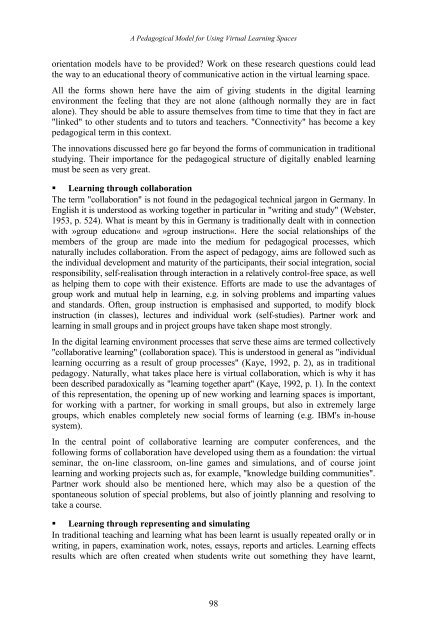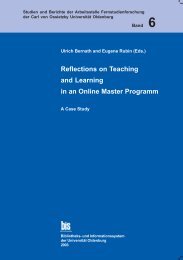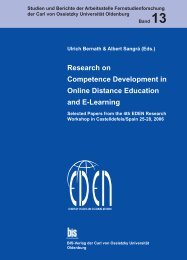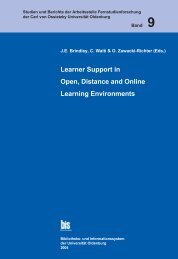Distance Education in Transition - Master of Distance Education ...
Distance Education in Transition - Master of Distance Education ...
Distance Education in Transition - Master of Distance Education ...
Create successful ePaper yourself
Turn your PDF publications into a flip-book with our unique Google optimized e-Paper software.
A Pedagogical Model for Us<strong>in</strong>g Virtual Learn<strong>in</strong>g Spaces<br />
orientation models have to be provided? Work on these research questions could lead<br />
the way to an educational theory <strong>of</strong> communicative action <strong>in</strong> the virtual learn<strong>in</strong>g space.<br />
All the forms shown here have the aim <strong>of</strong> giv<strong>in</strong>g students <strong>in</strong> the digital learn<strong>in</strong>g<br />
environment the feel<strong>in</strong>g that they are not alone (although normally they are <strong>in</strong> fact<br />
alone). They should be able to assure themselves from time to time that they <strong>in</strong> fact are<br />
"l<strong>in</strong>ked" to other students and to tutors and teachers. "Connectivity" has become a key<br />
pedagogical term <strong>in</strong> this context.<br />
The <strong>in</strong>novations discussed here go far beyond the forms <strong>of</strong> communication <strong>in</strong> traditional<br />
study<strong>in</strong>g. Their importance for the pedagogical structure <strong>of</strong> digitally enabled learn<strong>in</strong>g<br />
must be seen as very great.<br />
� Learn<strong>in</strong>g through collaboration<br />
The term "collaboration" is not found <strong>in</strong> the pedagogical technical jargon <strong>in</strong> Germany. In<br />
English it is understood as work<strong>in</strong>g together <strong>in</strong> particular <strong>in</strong> "writ<strong>in</strong>g and study" (Webster,<br />
1953, p. 524). What is meant by this <strong>in</strong> Germany is traditionally dealt with <strong>in</strong> connection<br />
with »group education« and »group <strong>in</strong>struction«. Here the social relationships <strong>of</strong> the<br />
members <strong>of</strong> the group are made <strong>in</strong>to the medium for pedagogical processes, which<br />
naturally <strong>in</strong>cludes collaboration. From the aspect <strong>of</strong> pedagogy, aims are followed such as<br />
the <strong>in</strong>dividual development and maturity <strong>of</strong> the participants, their social <strong>in</strong>tegration, social<br />
responsibility, self-realisation through <strong>in</strong>teraction <strong>in</strong> a relatively control-free space, as well<br />
as help<strong>in</strong>g them to cope with their existence. Efforts are made to use the advantages <strong>of</strong><br />
group work and mutual help <strong>in</strong> learn<strong>in</strong>g, e.g. <strong>in</strong> solv<strong>in</strong>g problems and impart<strong>in</strong>g values<br />
and standards. Often, group <strong>in</strong>struction is emphasised and supported, to modify block<br />
<strong>in</strong>struction (<strong>in</strong> classes), lectures and <strong>in</strong>dividual work (self-studies). Partner work and<br />
learn<strong>in</strong>g <strong>in</strong> small groups and <strong>in</strong> project groups have taken shape most strongly.<br />
In the digital learn<strong>in</strong>g environment processes that serve these aims are termed collectively<br />
"collaborative learn<strong>in</strong>g" (collaboration space). This is understood <strong>in</strong> general as "<strong>in</strong>dividual<br />
learn<strong>in</strong>g occurr<strong>in</strong>g as a result <strong>of</strong> group processes" (Kaye, 1992, p. 2), as <strong>in</strong> traditional<br />
pedagogy. Naturally, what takes place here is virtual collaboration, which is why it has<br />
been described paradoxically as "learn<strong>in</strong>g together apart" (Kaye, 1992, p. 1). In the context<br />
<strong>of</strong> this representation, the open<strong>in</strong>g up <strong>of</strong> new work<strong>in</strong>g and learn<strong>in</strong>g spaces is important,<br />
for work<strong>in</strong>g with a partner, for work<strong>in</strong>g <strong>in</strong> small groups, but also <strong>in</strong> extremely large<br />
groups, which enables completely new social forms <strong>of</strong> learn<strong>in</strong>g (e.g. IBM's <strong>in</strong>-house<br />
system).<br />
In the central po<strong>in</strong>t <strong>of</strong> collaborative learn<strong>in</strong>g are computer conferences, and the<br />
follow<strong>in</strong>g forms <strong>of</strong> collaboration have developed us<strong>in</strong>g them as a foundation: the virtual<br />
sem<strong>in</strong>ar, the on-l<strong>in</strong>e classroom, on-l<strong>in</strong>e games and simulations, and <strong>of</strong> course jo<strong>in</strong>t<br />
learn<strong>in</strong>g and work<strong>in</strong>g projects such as, for example, "knowledge build<strong>in</strong>g communities".<br />
Partner work should also be mentioned here, which may also be a question <strong>of</strong> the<br />
spontaneous solution <strong>of</strong> special problems, but also <strong>of</strong> jo<strong>in</strong>tly plann<strong>in</strong>g and resolv<strong>in</strong>g to<br />
take a course.<br />
� Learn<strong>in</strong>g through represent<strong>in</strong>g and simulat<strong>in</strong>g<br />
In traditional teach<strong>in</strong>g and learn<strong>in</strong>g what has been learnt is usually repeated orally or <strong>in</strong><br />
writ<strong>in</strong>g, <strong>in</strong> papers, exam<strong>in</strong>ation work, notes, essays, reports and articles. Learn<strong>in</strong>g effects<br />
results which are <strong>of</strong>ten created when students write out someth<strong>in</strong>g they have learnt,<br />
98





